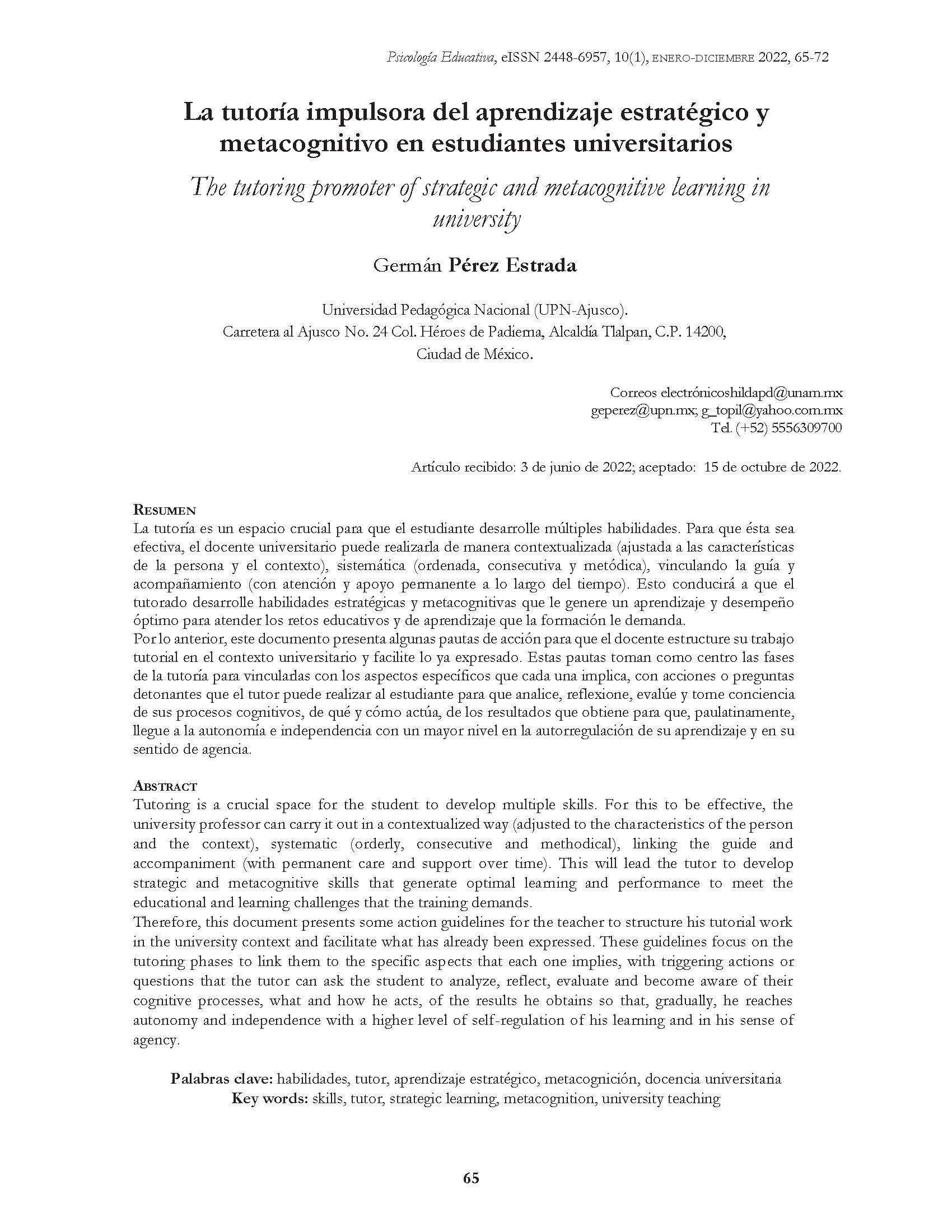Abstract
Tutoring is a crucial space for the student to develop multiple skills. For this to be effective, the university professor can carry it out in a contextualized way (adjusted to the characteristics of the person and the context), systematic (orderly, consecutive and methodical), linking the guide and accompaniment (with permanent care and support over time). This will lead the tutor to develop strategic and metacognitive skills that generate optimal learning and performance to meet the educational and learning challenges that the training demands.
Therefore, this document presents some action guidelines for the teacher to structure his tutorial work in the university context and facilitate what has already been expressed. These guidelines focus on the tutoring phases to link them to the specific aspects that each one implies, with triggering actions or questions that the tutor can ask the student to analyze, reflect, evaluate and become aware of their cognitive processes, what and how he acts, of the results he obtains so that, gradually, he reaches autonomy and independence with a higher level of self-regulation of his learning and in his sense of agency.
References
Arnaiz, P. e Isús, S. (1998). La programación de la acción tutorial. En P. Arnaiz y S. Isús, La tutoría: organización y tareas (pp. 15-43). Graó.
Castañeda, S., Peñalosa E., Austria, F. (2014). Perfiles agentivos y no agentivos en la formación del psicólogo. Universidad Nacional Autónoma de México, Facultad de Psicología
Crispín, M., Caudillo, L., Doria, C. y Esquivel, M. (2011). Aprendizaje autónomo. En M. L. Crispín (Coord.), Aprendizaje autónomo. Orientaciones para la docencia (pp. 49-65). Universidad Iberoamericana, AC. https://ibero.mx/web/filesd/publicaciones/aprendizaje-autonomo.pdf
Díaz Barriga, F. y Hernández, G. (2007). Estrategias docentes para un aprendizaje significativo. McGraw Hill
Domínguez, M. (2005). Es el docente un profesional reflexivo. DIDAC, 46, Otoño, 14-17. http://revistas.ibero.mx/didac/articulo_detalle.php?id_volumen=16&id_articulo=194
Gómez, L. (2012). Acompañamiento. Una herramienta de enseñanza-aprendizaje para personas adultas. Tesis de Maestría. Facultad de Psicología, Universidad Nacional Autónoma de México.
Hernández, G. (1998). Paradigmas en psicología de la educación. Editorial Paidós Mexicana
Loredo, J., García, B., Mendoza, N. y García, H. (2018). ¿Cómo se reflejan las prácticas docentes de profesores universitarios en tres momentos clave de la clase: la planeación, conducción y evaluación? EDETANIA, 54, Diciembre, 147-170. https://revistas.ucv.es/edetania/index.php/Edetania/article/view/409
Ojalvo, V. (2005). Orientación y tutoría como estrategia para elevar la calidad de la educación. Revista Cubana de Educación Superior 25(2), 3-18. https://www.researchgate.net/publication/237486250_ORIENTACION_Y_TUTORIA_COMO_ESTRATEGIA_PARA_ELEVAR_LA_CALIDAD_DE_LA_EDUCACION
Riart, J. (2006). El tutor, ¿quién es? En S. Gallego y J. Riart. (Coords.) La Tutoría y la orientación en el siglo XXI: nuevas propuestas (pp. 27-39). Octaedro.
Torrano, F., Fuentes, J. y Soria, M. (2017). Aprendizaje autorregulado: estado de la cuestión y retos psicopedagógicos. Perfiles educativos, 39(156), Abril-Junio, 160-173. https://www.scielo.org.mx/scielo.php?script=sci_arttext&pid=S0185-26982017000200160
Trías, D. y Huertas, J. (2020). Autorregulación en el aprendizaje. Manual para el asesoramiento psicoeducativo. Ediciones Universidad Autónoma de Madrid https://libros.uam.es/uam/catalog/book/985
Ventura, A., Cattoni, M. y Borgobello, A. (2017). Aprendizaje autorregulado en el nivel universitario: Un estudio situado con estudiantes de psicopedagogía de diferentes ciclos académicos. Revista Electrónica Educare, 21(2), Mayo-Agosto, 1-20. https://www.redalyc.org/journal/1941/194154995016/html/

This work is licensed under a Creative Commons Attribution-NonCommercial-NoDerivatives 4.0 International License.
Copyright (c) 2024 Universidad Nacional Autónoma de México


